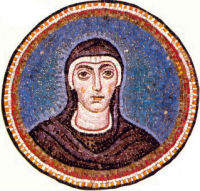Lent: March 7th
Saturday of the First Week of Lent; Optional Memorial of Sts. Perpetua and Felicity, martyrs
Other Titles: St. Felicitas
» Enjoy our Liturgical Seasons series of e-books!
The Church continues providing some suggestions on how to approach Lent: "If anyone wishes to come after me, he must deny himself and take up his cross daily and follow me."
The account of the martyrdom of Saints Perpetua and Felicity forms one of the finest pages of the history of the first centuries of the Church. It shows us clearly the wonderful sentiments of these two women when they heard that they had been condemned to the wild beasts. Knowing their own weakness but relying on the strength of Christ, who was fighting with them, they went to their martyrdom as to a triumphant celebration, to which they were invited by Christ. They were exposed to the fury of wild beasts in the amphitheater at Carthage, A.D. 203, and finally killed by the sword. Their names are still mentioned together in the Roman Canon of the Mass.
Today is the Ember Saturday of the traditionally observed Lenten or Spring Ember Days. There are two principal objects for the Ember Days of this period of the year: the first is to publicly offer thanks to God the season of Spring, and secondly to ask God to bless the fruits of the earth and human labor. A third traditional focus of the Ember Days is to ask Him to enrich with His choicest graces the priests and sacred ministers particularly those who might be ordained on this day. See Lenten Ember Days for more information.
According to the 1962 Missal of St. John XXIII the Extraordinary Form of the Roman Rite, today is the feast of St. Thomas Aquinas which is now celebrated in the Ordinary Form on January 28.
Sts. Perpetua and Felicity
 Vibia Perpetua, a well-to-do young woman and mother, and Felicitas, a slave who gave birth to a child three days before suffering a martyr's death, were catechumens. Against such prospective converts the persecution of Septimius Severus was particularly severe. These two holy women suffered death on the seventh of March in Carthage. The Breviary relates the following touching episode:
Vibia Perpetua, a well-to-do young woman and mother, and Felicitas, a slave who gave birth to a child three days before suffering a martyr's death, were catechumens. Against such prospective converts the persecution of Septimius Severus was particularly severe. These two holy women suffered death on the seventh of March in Carthage. The Breviary relates the following touching episode:
Now the day had arrived when they were to be thrown to the wild beasts. Felicitas began to be sorrowful because she feared she would have to wait longer than her companions. For eight months she had been pregnant and therefore, according to Roman law, could not be executed before the birth of the child. But the prayers of her fellow sufferers hastened her time and she gave birth to a baby girl.
While she was suffering from the pains of childbirth, one of the guards called out to her, "If you are suffering so much now, what will you do when you are thrown to the wild beasts?" "Now I suffer," she answered, "but there Another will be in me, who will suffer for me, because I will suffer for Him." When she was in travail she had sorrow, but when she was set before the wild beasts she rejoiced (Martyrology).
Finally, on the seventh of March, these heroic women were led into the amphitheater and severely scourged. Then they were tossed about by an exceptionally wild cow, gored, and thrown to the ground.
—Excerpted from The Church's Year of Grace, Pius Parsch
Patronage: Perpetua—Cattle; ranchers; death of children; martyrs; married women; Carthage, Tunisia; Santa Perpètua de Mogoda, Catalonia, Spain
Felicity—Cattle; ranchers; death of children; martyrs; sterility; to have male children
Symbols and Representation: Perpetua—cow; woman with a sword beside her; woman with a bull, ox, leopard or lion in an amphitheater; Seven swords; cauldron of oil and sword; sword with seven heads; eight palms
Felicity—bull; cow; pregnant woman holding a cross; woman with a sword by her; woman with a bull or ox in an amphitheater
Highlights and Things to Do:
- The story of the sufferings of today's saints is preserved for us in authentic "Acts of the Martyrs" that were composed partly by the saints themselves, and partly by eyewitnesses (perhaps Tertullian). The account may be classed with the most beautiful portions of ancient Christian literature that have come down to us. Read CIN's account.
- Read about the locations of their relics.
- Read more about Sts. Perpetua and Felicity:
- Watch Sts. Perpetua and Felicity.
- Listen to Catholic Culture's Way of the Father's podcast, Ep. 15—Perpetua: A Rare Female Voice from Antiquity by Mike Aquilina.
- Listen to Catholic Culture's Audiobook Tertullian—The Martyrdom of Perpetua and Felicity by James Majewski.






